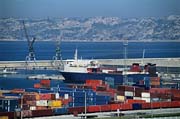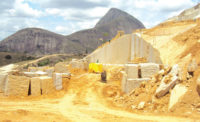
For most of this year, Brazilian importers and exporters of stone have been facing delivery problems due to the shortage of shipping containers, a lack of allotment of space for shipping vessels, and the poor infrastructure of the ports in Brazil. According to several companies affected by this shipping setback, they are struggling to keep their exports flowing from the main stone-handling port of Vitoria, Brazil.
According to Carlo Columbo from Savino del Bene -- a leading Italian international freight forwarder with facilities in South America, Europe, Africa, Indian subcontinent, Far East and Oceania -- the shipping situation came about in February of this year. “There was a shortage of seeds in the U.S., and they had to get them from Brazil,†said Columbo, who added that since harvest season is limited, Brazil had to ship out many containers right away. “This took priority over all other equipment and products, and began the container shortage. Then coffee season came, and the same thing happened all over again.â€
Columbo expressed that the problem is not necessarily a lack of containers, but that there is not enough room on the vessels to transport the containers back and forth to Brazil; therefore, many remain in the U.S. “We only get a certain amount of containers each month and now, because of this shortage, we get one-third of what we used to,†said Columbo. “There just isn't enough room on the vessels to carry the amount of containers available, so we are all losing business. You can no longer ship what you want and need to.â€
Since vessels tend to cost up to $250 million and take approximately two years to build, Columbo feels that building more transport ships is not a feasible, timely solution to the problem. Also, he reports that used containers can cost between $2,000 and $5,000, and new open top containers can cost up to $10,000. Furthermore, having more of the containers readily available won't matter since there is not enough room for them aboard the shipping vessels anyway. He suggested that the Brazilian government should put a few of their state-owned vessels at company's disposal. However, he does not feel that they will get involved any time soon. Columbo also feels that the steamship lines that transport the goods should provide their own containers.
He added, “The steamship lines are moving their vessels to China because it is a more lucrative market. Companies are changing their routes in order to make more money.†Columbo feels that as a result of this, prices will increase. “If you want it, you will pay more,†he said.
Reginaldo Tedeschi, vice president/director of Brasvit Granitos & Mineracao S.A -- a producer and exporter of Brazilian granite -- agreed. “The majority of stone producers and exporters are being forced to search different ports as an alternative and paying additional inland freight to forward their shipments in time.†He said that a recent survey has confirmed that ship-owners are redirecting their vessels to other routes such as those in the Far East in search of higher profitability.
Brazil's growth as an exporter over the past few years -- for stone as well as other products -- has also played a major factor. The nation's infrastructure is not large enough to accommodate these increases, and the ports haven't seen the necessary investments to cope with such a high demand. Ken Saretsky from ABC Worldwide Stone, which has also been experiencing late shipment arrivals, said that he has been told that the port in Vitoria, Brazil “needs to be dredged and reconstructed to accommodate booming exports.†He has also been informed that the shipping companies don't like to ship stone because of its weight. “They prefer to ship lighter containers; they can get more on a vessel and yield higher profits,†he said.
The lack of shipping means has been a problem throughout Brazil, not just in the Port of Vitoria. The Tribune of Santos, Sao Paulo, Brazil, reported that the Port of Santos is lacking 70,000 containers in all, and the current deficit is 45,000 containers per month. “I believe that this number is a record. There is load, but there are no containers,†Jovelino Dias, coordinator of the Integrated Logistics Chamber, told The Tribune.
The Brazilian newspaper went on to report that since Brazil's exports far outnumber the nation's imports, most containers have to come to Brazil empty, which is not an attractive option for shippers. One estimate reports that the number of containers that leave Brazil outnumber ones entering the country by a margin of three to one.
According to Tedeschi, “an unprecedented amount of cargo is being left behind due mainly to the small number of vessels touching port of Vitoria.†Tedeschi also claims that the situation has been deteriorating due to an overwhelming increase of granite exports, as well as other commodities, including sugar and coffee, resulting in a much higher volume of containers being handled at the Vila Velha (TVV) terminal, located well north of Vitoria.
“Exporters from Vitoria are now struggling with each other to obtain -- through the shipping agents -- the maximum possible amount of containers and vessel cargo area,†said Tedeschi. “They want to avoid being left behind with their shipment and consequently give up a share of monthly revenues. Let us see if this carnage situation will lead to a quick solution to the problem.â€
According to these shippers, however, no real solution has yet been proposed.
